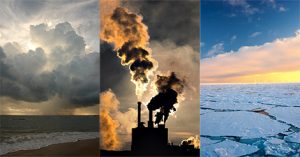Global Warming – Effects, Prevention, An Over View
Global warming
Global warming is occurring when carbon dioxide (CO2) and other air pollutants collect in the atmosphere and absorb sunlight or solar radiation that have bounced off the earth’s surface. Normally this radiation would escape into the space, but these pollutants, which can be last for years to the centuries in the atmosphere, trap the heat and cause the planet to get hotter. These heat-trapping pollutants specifically carbon dioxide, methane, nitrous oxide, water vapor, and synthetic fluorinated gases are known as greenhouse gases, and their impact is called the Greenhouse Effects. Global Warming is the rise in average temperatures of across the globe, which has been ongoing at least since record keeping began in 1880.
Although people tend to use these terms interchangeably, global warming is just one aspect of climate changes. “Global warming” refers to the rise in global temperatures due to mainly, the increasing concentrations of greenhouse gases in the atmosphere.
One of the most dramatic effects of the global warming is the reduction in Arctic sea ice. Sea ice hit records-low extents in both the fall and winter of 2015 and 2016, meaning that at the time when the ice is supposed to be at its peak, it was lagging. The melt means there is less thick sea ice that persists for multiple years. That means the less heat is reflected back into the atmosphere, by the shiny surface of the ice and more is absorbed by the comparatively darker ocean, creating a feedback loop that causes even more melt, according to NASA’s Ice Bridges.
Impacts of Global Warming
Each year scientists learn more about the Consequence of Global Warming, and each year we also gain new evidence of its devastating impact on people and the planet. As the heat waves, droughts, and floods associated with climate change become more frequent and more intense, communities suffer and death tolls rise. Normally the radiations would escape into space, but these pollutants, which can last for years to the centuries in the atmosphere, trap the heat and cause the planet to get hotter.
Other Effects of Global Warming
- Disappearing Glacier, early snowmelt, and severe droughts will cause more dramatic water shortages and continue to increase the risk of wildfires in the American West.
- Rising Sea Level will lead to even more coastal flooding on the Eastern Seaboard, especially in Florida, and in other areas such as the Gulf of Mexico.
- Forests, farms, and cities will face troublesome new posts, heat waves, heavy downpours, and increased flooding. All of these can damage or destroy agriculture and fisheries.
- Disruption of habitats such as coral reefs and alpine meadows could drive many plant and animal species to extinction.
- Allergies, asthma, and infectious disease outbreaks will become more common due to increase the growth of pollen-producing ragweed, higher levels of air pollution, and the spread of conditions favorable to pathogens and mosquitoes.
Causes of Global Warming
- Oil and Gas – Oil and Gas is used all the time in almost every industry.
- Deforestation. Deforestation is the clearance of woodland and forest-this is either done for the wood.
- Power Plants
- Oil Drilling
- Transport and Vehicles
- Consumerism
Prevention
- Limiting the amounts of energy in your home by using energy efficient light bulbs and appliances, and knowing how to use the appliances properly.
- Use an air conditioner and heater only when necessary, and make sure your house is properly insulated.
- Use a hot water sparingly and use cold water when washing clothes and dishes.
- Reduce the driving and use other means of transportation like walking, biking or carpooling.
- Recycle and use reusable bags for purchases and use the refillable water bottles.


